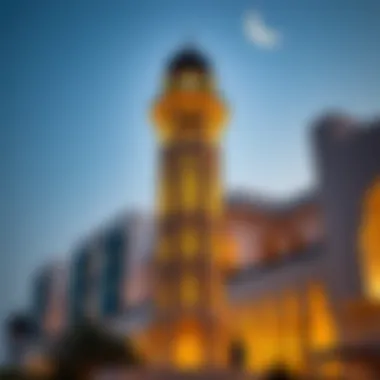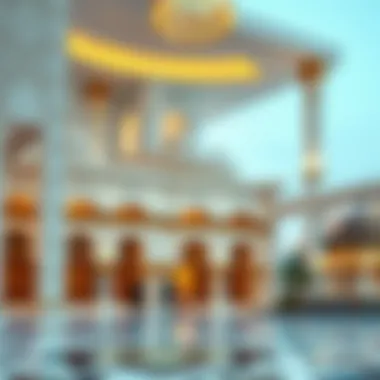Ramadan 2023 Timings in the UAE: A Detailed Guide


Intro
Ramadan, the holy month for millions of Muslims around the world, holds a special significance in the United Arab Emirates. It’s more than just a time for fasting; it’s a period where communities come together, traditions are celebrated, and the essence of spirituality is deeply felt. As the calendar now turns to 2023, understanding the timings and customs associated with Ramadan in the UAE becomes essential for both residents and those interested in the region's unique cultural landscape.
This article aims to serve as a comprehensive guide that dives into the specifics of Ramadan 2023. From the timing of prayers to the nuances of daily life during this sacred month, each aspect will be thoroughly explored. Not only will we discuss the spiritual significance, but we’ll also touch upon how Ramadan impacts everyday practices, including the real estate market, which often sees shifts during this time.
Through this overview, individuals looking to navigate their way through Ramadan, be it for personal observance or business interests, will find actionable insights that shed light on the intricacies of this month-long observance.
Understanding Ramadan
Ramadan stands as a monumental pillar of Islamic tradition, encapsulating a multitude of meanings and experiences that resonate deeply with Muslims and the wider community in the United Arab Emirates. It is not simply a period of fasting but represents a time for spiritual reflection, community bonding, and a renewed connection to faith. Understanding Ramadan in the context of 2023 in the UAE requires diving into its historical roots, the vibrant cultural practices that accompany it, and the religious obligations it imposes on the faithful.
Historical Significance
Historically, Ramadan is anchored in the Islamic calendar, marking the month in which the Quran was revealed to the Prophet Muhammad. This event is commemorated each year, reminding Muslims of their spiritual heritage. The mere act of fasting during this month is seen as a re-affirmation of faith.
In the UAE, like in various other Islamic countries, Ramadan has evolved into a festival of generosity and compassion. It has historical underpinnings, relating back not only to Islamic teachings but also to a shared cultural legacy of perseverance and communal solidarity. The communal aspects extend beyond mere family bonds; they encompass larger community ties, with the act of sharing iftar meals bringing together individuals from diverse backgrounds.
"Fasting is a shield; it prevents one from entering the Fire and protects one from sins."
This historical significance of Ramadan shines through in various events, lectures, and public gatherings that occur throughout the month. The essence of Ramadan is palpable in the air, echoed in conversations and communal activities, shaping the spirit of unity.
Cultural Practices in the UAE
In the UAE, cultural practices during Ramadan blend tradition with modernity, creating unique experiences. One notable aspect is the nightly iftar gatherings, where the fast is broken with dates and water, often followed by a feast. This meal not only offers sustenance but also creates an opportunity for community interaction. Families often invite neighbors and friends to join, cementing relationships and extending the spirit of giving.
Moreover, it's common to see numerous cultural events taking place during this holy month. From art exhibitions to poetry readings and traditional music performances, Ramadan fosters a vibrant atmosphere across cities like Dubai and Abu Dhabi. Many hotels and restaurants present special iftar menus, allowing residents and tourists alike to indulge in culinary delights specific to this season.
Customary practices also include the decoration of homes with lights and lanterns, creating a festive ambiance. Street festivities, such as cultural festivals that showcase the unique Emirati identity, further enhance this experience, making Ramadan a joyous occasion for everyone.
Religious Obligations
The religious obligations during Ramadan cannot be overstated. Muslims are required to fast from dawn until sunset, abstaining from food, drink, and other physical needs. This period of fasting is not merely physical; it extends into spiritual realms, where self-discipline and piety are paramount.
Fasting serves as a time for believers to engage more deeply in prayer and reflections. The five daily prayers (Salah) take center stage, with many attending additional nightly prayers known as Taraweeh. For many in the UAE, this month is also an opportunity to increase charitable giving (zakat), reminding them to aid those less fortunate.
Timing of Ramadan in
The timing of Ramadan is a crucial subject as it not only determines the beginning and end of fasting but also influences various aspects of life in the UAE. The dates are not fixed on the Gregorian calendar, making the celestial observation of the crescent moon very significant. In 2023, understanding these timings becomes even more essential for residents, businesses, and investors in the region, as it affects work schedules, social gatherings, and community obligations.
Start and End Dates
Ramadan in 2023 is anticipated to commence on the evening of March 23 and conclude on the evening of April 21, although these dates are contingent on moon sightings. The first day of fasting will likely be on March 24, and it is customary for the end of Ramadan, celebrated as Eid al-Fitr, to start the next day when the moon is sighted. This lunar cycle indicates the rhythm of life during the holy month and shapes many religious practices.
It's important to keep an eye on local announcements often made by mosques or religious authorities to confirm these dates, as variations can occur based on the moon's visual appearance based on geographical locations.
Daily Fasting Hours


During Ramadan, daily fasting hours vary across the UAE. In 2023, fasting is expected to stretch approximately 14 to 15 hours each day. For example, fasting may commence around 5:00 AM, just before the Fajr prayer, and break at approximately 6:30 PM, coinciding with the Maghrib prayer.
This extended period calls for strategic planning regarding meals; Suhoor, the pre-dawn meal, must be nutritious to carry individuals through the day, while Iftar, the meal to break the fast, is a significant event, often marked by communal gatherings. The meal often starts with dates and water, following the tradition of the Prophet Muhammad.
Significance of the Crescent Moon
The crescent moon holds immense cultural and religious significance during Ramadan. Its sighting marks the beginning of the holy month and is a tradition steeped in history and faith. Each year, observers in the UAE gather to spot the new moon, which not only heralds the arrival of Ramadan but also reinforces community ties and participatory customs.
This practice is more than just astronomical; it reflects a sense of continuity and shared belief among Muslims. The crescent moon serves as a symbol of hope and renewal, guiding individuals in their devotion and reflection during this sacred time. In the UAE, it is a reminder of the deep-rooted traditions that coexist harmoniously with modernity, illustrating the unique blend of cultural heritage within this vibrant region.
"The sighting of the crescent moon not only signals the start of fasting but also serves as a cherished community event that embodies both spirituality and social connection."
Understanding the timing of Ramadan ultimately enriches the experience for everyone involved, from the devout practitioners to the casual observers.
Prayer Timings During Ramadan
The sacred month of Ramadan is not just a time for fasting but also a period rich in spiritual practices and community engagement. Prayer timings hold particular significance, guiding the daily rhythm of life for Muslims in the UAE and beyond. For those within the real estate market, understanding these timings can illuminate how Ramadan affects daily operations, client interactions, and even property value in the region.
Fajr Prayer Timing
Fajr, the dawn prayer, marks the beginning of the fasting day. In 2023, the prayers will typically occur around 4:30 AM to 5:00 AM, depending on the exact location within the UAE. This pre-dawn prayer forms a vital part of the daily spiritual routine, serving as a time for reflection and devotion. During Ramadan, the Fajr prayer reminds individuals that the day ahead should be filled with purpose and mindfulness. Fasting begins just after this prayer, and it’s crucial for participants to prepare well, perhaps with a hearty pre-dawn meal called Suhoor.
Moreover, the Fajr prayer timing acts as a cornerstone for setting one’s intentions throughout the day. Rituals surrounding this prayer encourage community members to assemble, fostering connections within neighborhoods. Those involved in real estate can leverage these congregative moments by engaging with potential buyers and sellers, opening discussions about properties over shared meals or post-prayer gatherings.
Maghrib Prayer Timing
As the sun sets, the Maghrib prayer becomes the signal for breaking the fast. In 2023, this prayer will generally fall between 6:45 PM and 7:15 PM. At this time, families and communities gather for Iftar, the meal to break their fast, creating a robust social atmosphere. This aspect of the day carries not only spiritual significance but also practical implications, as businesses are often influenced by these collective meal times.
During this period, those in the real estate sector might find opportunities for networking, especially during Iftar gatherings. Agents can schedule informal meetings or open houses around these timings to engage with clients who are more relaxed after their day of fasting. Furthermore, it is essential to consider the vibrant market dynamics that occur in the evenings; many families might be exploring new properties or neighborhoods during this time, aiming to settle in before Eid.
Taraweeh Prayer Timing
Taraweeh prayers are an important feature of Ramadan evenings, held after the Isha prayer. Typically occurring around 8:30 PM to 9:00 PM, these prayers involve additional recitations and create an opportunity to come together as a community. Many mosques in the UAE host Taraweeh prayers which can see tremendous turnouts, especially during the last ten days of Ramadan when spiritual fervor peaks.
Though Taraweeh prayers have religious significance, they present another layer of engagement for the real estate market. During these evenings, communities bond through shared worship and can lead to discussions about living environments, neighborhoods, and even real estate issues. Developers and agents can grasp the mood of the community while also considering the adjustment of their services during peak prayer timings over speed and customer service.
"Prayer times shape the rhythm of daily life during Ramadan, influencing community interactions and market behaviors."
Navigating these prayer timings not only enriches one's understanding of Ramadan but also highlights the unique intertwining of spirituality and commerce in the UAE. It is a fascinating dimension worth considering for those looking to invest or operate within this dynamic market.
Impact of Ramadan on Daily Life
The month of Ramadan uniquely reshapes the everyday rhythm of life in the UAE. Observing the fast is not merely an act of abstaining from food and drink; it transcends to touch almost every aspect of society, from work dynamics to social interactions. For investors and residents alike, understanding these dynamics offers valuable insights into navigating this significant period. The importance of this topic lies in recognizing how the spirit of Ramadan creates a shift in behavior, communication, and overall lifestyle, which can have subsequent effects on various sectors, including real estate and public services.
Work Hours Adjustments
During Ramadan, work hours often shift to accommodate fasting. In the UAE, the usual nine-to-five schedule adjusts to shorter hours, typically spanning from 9 AM to 3 PM, though this may vary by sector. For example, some businesses, especially in retail and hospitality, may completely change their operating hours, extending them into the evening when Iftar meals are commonly served.


This adjustment serves to respect those who fast, allowing them to fulfill their spiritual commitments while maintaining productivity. The shortening of work hours also leads to a noticeable change in productivity levels in various fields. Employers and employees alike may experience fatigue as they adjust to lighter workloads and extended breaks.
- Flexible Hours: Some companies offer more flexible hours, allowing for staggered shifts to accommodate individual fasting preferences and needs.
- Enhanced Breaks: Long breaks are often instituted for afternoon prayers, encouraging team cohesion and spiritual reflection among colleagues.
Changes in Public Services
Public services in the UAE also undergo transformations during Ramadan. Government offices typically function on reduced hours, and many have set their operations from 9 AM to 2 PM or similar timeframes. This alteration can lead to longer wait times and reduced access to services for the general public.
Moreover, public transportation schedules may see variances, especially during the evenings when an influx of people travel for community festivities and Iftar meals.
- Emergency Services: Emergency services remain operational, often adjusting their protocols to ensure that they adequately handle calls during this busy season.
- Public Awareness Campaigns: Authorities often run campaigns to remind the public of these changes and encourage good practices, such as responsible driving after Iftar, due to increased traffic congestion.
Social Gatherings and Iftar
The social tapestry of the UAE thrives during Ramadan, with Iftar gatherings becoming a focal point. Families and friends often come together to break their fast at sunset, sharing meals that vary from traditional Emirati dishes to a mix of international cuisines.
These gatherings foster community bonds and promote inclusivity, as many establishments offer special Iftar menus at affordable prices, inviting everyone to partake.
- Cultural Events: Throughout Ramadan, various cultural events pop up around the country, enriching the atmosphere with opportunities for socializing and cultural learning.
- Charitable Initiatives: Ramadan is also a time for charity and giving back. Many people participate in community service and donate to those in need, further showcasing the importance of communal support during this sacred month.
Many find joy and a deeper connection through these social gatherings, turning ordinary lives into extraordinary experiences filled with warmth and generosity.
"In Ramadan, it’s not just about the fast; it's about bringing people together and sharing kindness, enriching both our hearts and our communities."
As such, understanding these aspects of daily life during Ramadan can provide critical insights for those engaged in real estate and other sectors, enhancing both business practices and social interactions in the UAE.
Real Estate Considerations during Ramadan
Ramadan is a special month for Muslims, often characterized by reflection and community. However, beyond its spiritual implications, this holy month also brings about changes in the real estate landscape in the UAE. Understanding these changes is crucial for investors, home buyers, and agents as they navigate through opportunities and challenges that arise during this time.
Market Activity Patterns
During Ramadan, real estate activity tends to fluctuate from the usual patterns observed in other months. It is common for potential buyers and investors to slow down their decisions, often waiting until after Eid al-Fitr to engage in significant transactions. The atmosphere is more subdued, with many people focused on family and religious activities, which impacts showings and open houses.
- Fewer viewings: Many people refrain from engaging in property viewings during the fasting hours. Agents often experience lower attendance at property videos these weeks.
- Extended negotiations: Given the cultural significance of Ramadan, when buyers do engage, negotiations often take longer. Buyers may want to consider properties but wait for the right moment to commit.
- Increased demand post-Ramadan: As the month concludes, there is typically a surge in inquiries. Investors may find that properties become even more in demand once fasting ends, pushing prices higher.
Investment Opportunities
For savvy investors, Ramadan can unveil unique opportunities. While some may shy away from investing during this time, a deeper look shows that strategic investors could capitalize on trends within the market:
- Discounts and offers: Developers may provide special promotions or discounts during Ramadan, aiming to encourage buyers who are still eager to invest despite the season.
- Focus on family-oriented properties: The community spirit during Ramadan leads to an increase in requests for larger family homes or villas. Investors can, therefore, steer their focus towards properties that cater to extended families or have large communal spaces.
- Emergence of new projects: Ramadan often serves as a catalyst for new project announcements post-holiday, which can provide insights into investment potential for future developments.
Property Transactions in Ramadan
Real estate transactions during Ramadan may follow their distinct rhythm. Due diligence should be prioritized to ensure that contracts are not rushed amid cultural practices. Important aspects to keep in mind include:
- Timing of transactions: Many buyers might postpone executing contracts until after Eid. Communication is key; clear timelines can aid in smooth negotiations
- Cultural sensitivity: When closing deals, understanding the importance of the month is crucial. It is important to be respectful of the customs and consider adjusting meeting times to accommodate fasting schedules.
- Documentation preparations: Since some professionals might observe their fasts, it’s wise to prepare documents early and have everything in order before transactions approach their deadlines. Cold feet can occur as emotions may run high during this season for various reasons, and clarity is essential.


"For those buying or selling, Ramadan may present quiet waters, but patience often brings fruitful shore results."
In summary, the real estate market during Ramadan may have variations in buyer behavior, participation rates, and timing for transactions. Understanding these nuances not only positions investors advantageously but also helps real estate agents better serve their clients' needs.
In this month of reflection, investors who maintain a clear perspective can find hidden treasures awaiting them within the real estate market.
Health and Well-Being during Ramadan
Ramadan is not just a time for spiritual reflection; it also significantly impacts physical and mental health for many. It’s a month where people engage in fasting, prayer, and contemplation. Understanding how to manage one's health during this period is crucial, especially with the changes to daily routines and eating habits. The emphasis on health and well-being during Ramadan addresses several key elements that are essential for those observing this holy month, particularly in the unique environment of the UAE.
Nutritional Guidance
Eating well during Ramadan can make a world of difference. Skipping meals can lead to fatigue and irritability, which aren't conducive to a positive fasting experience. Therefore, it's vital to focus on balanced meals. Here’s how:
- Iftar and Suhoor: These two meals are your lifelines. Iftar, breaking the fast at sunset, should be a mix of dates (for natural sugars) and water, slowly followed by a nutritious meal. Suhoor, eaten before dawn, is also essential. Opt for whole grains, proteins, and plenty of vegetables.
- Stay Mindful of Sugars and Fats: Many people gravitate towards sweets and fried foods during Ramadan, but moderation is key. Heavy meals can lead to sluggishness during the day. Instead of traditional heavy dishes, consider baked or grilled options.
Hydration During Fasting
A common challenge is maintaining adequate hydration. The UAE's weather can be stifling, even in Ramadan. To dodge dehydration, consider the following:
- Drink Plenty of Water: Between iftar and suhoor, make it a goal to sip water regularly. A common recommendation is to drink about 2-3 liters. Infusing your water with fruits like lemon or mint can also make it more appetizing.
- Avoid Diuretics: Be cautious with caffeine; it can lead to increased urination, which isn't helpful when you're attempting to stay hydrated.
Mental Health Considerations
Mental well-being is often overlooked during Ramadan, but it's just as vital. The fasting period can be a mental strain, so here are some key aspects to consider:
- Emotional Balance: It's easy to become irritable when you're both hungry and tired. Engaging in mindfulness practices, such as meditation or gentle yoga, can improve emotional regulation.
- Community and Support: Many people find that sharing iftar with family and friends alleviates feelings of isolation. Engage in community events to foster connections and share experiences.
Ramadan is an opportunity for not just spiritual growth, but also for fostering healthy habits that can last well beyond the lunar month. Make use of this time to create a routine that prioritizes both mental and physical health, enhancing overall well-being.
By focusing on these aspects during Ramadan, participants can ensure that they navigate this sacred time with greater ease and health, setting a solid foundation for both personal and communal growth.
End
In summarizing the essence of Ramadan 2023 in the UAE, it’s clear that this period extends far beyond mere fasting. The implications of Ramadan touch on every facet of life in the country, influencing not only religious practices but also social, economic, and cultural dynamics. Understanding this significance is crucial not just for Muslims observing the month, but also for a broader audience including investors, home buyers, real estate agents, and developers.
Reflecting on Ramadan’s Impact
Ramadan carries with it a deep historical and cultural significance, serving as a time for reflection, community bonding, and charity. In the UAE, the spirit of Ramadan is palpable in bustling markets, traditional Iftar gatherings, and spiritual events that bring together people from various walks of life. The month fosters a strong sense of unity—reminding everyone that irrespective of their backgrounds, they share a collective experience.
One major consideration during this month is the shift in daily life rhythms. Working hours are adjusted, public transport services may have altered schedules, and restaurants operate differently, often closing during daylight hours. These changes reverberate through various sectors, including real estate. As many families and friends gather for Iftar, the demand for larger homes or properties with dining spaces can spike. Furthermore, businesses often see an uptick in foot traffic as evening prayer times lead to increased evening activities.
"Ramadan is not just a month of fasting, but a time of deep communal solidarity and charitable duty."
Looking Ahead to Future Ramadans
As we consider future Ramadans, it is essential to contemplate how the experience of this holy month will continue to evolve in a fast-paced urban setting. Technological advancements might play an integral role, perhaps incorporating apps designed to simplify Iftar planning or prayer time notifications. Real estate trends in the future could lean towards properties that cater specifically to the unique needs of Ramadan—such as larger kitchens for preparing traditional meals or outdoor spaces for gatherings.
The relationship between Ramadan and the real estate market will likely grow more pronounced, as developers recognize the potential for custom-built communities tailored to the spirit of this month. Sustaining the cultural habits and practices while integrating modern conveniences will remain a hot topic.
Thus, the conclusion of Ramadan is not merely a return to normalcy but rather a reminder that the lessons learned during this month can influence attitudes and practices for the months to come. As families gather, communities strengthen, and investments flourish, observing these shifts can provide valuable insights into market trends and community needs moving forward.
For further information, explore resources such as Wikipedia, Britannica, and community discussions on Reddit to dive deeper into the cultural and economic contexts of Ramadan.











